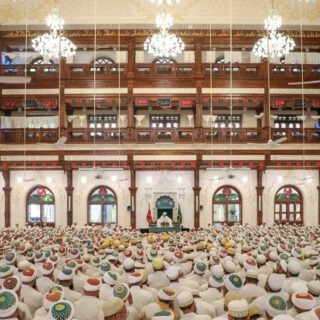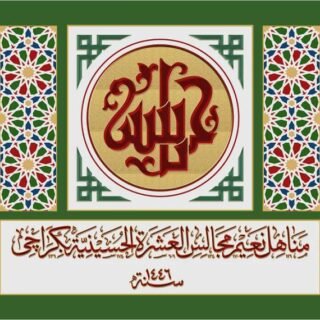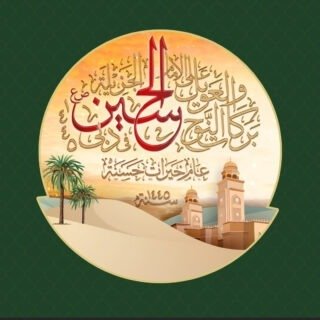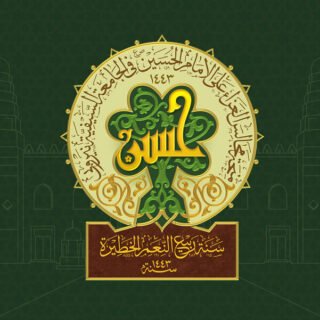7th ShehrAllah 1441 H
Today’s bayan focused on Surat al-Kaferoon, in which Rasul Allah SA addresses the disbeliever, ‘for you is your faith and for me my faith’. Throughout history, Awliya Allah AS have made efforts to foster an inclusive society that respects all faiths and beliefs.
The Fatimi Imams established a state that upheld the very model of governance and pluralism that Rasul Allah SA exemplified. Similar to the Conquest of Makkah, the Conquest of Misr (Egypt) reveals how the establishment of peace and harmony remained at the forefront of all their endeavours, military or otherwise. The Fatemiyeen AS retained many administrators from the previous regime and through a policy of tolerance and meritocracy, they allowed many of Egypt’s indigenous population to rise through the administrative ranks and serve in the best interests of the state – regardless of their faith.
Today, Syedna Mufaddal Saifuddin TUS repeatedly reminds us of Rasul Allah’s SA words, ‘love for one’s nation is an integral part of faith’. He guides Mumineen all over the world to be exemplary citizens and contribute to the nation’s development and growth. Furthermore, in times such as these, he directs us to come to the aid of all humanity and help them in their hour of need.
In this year’s Imtihan Sanawi, a question in the Year 1 Fiqh (jurisprudence) paper asked about the barakat one derives from the reciting the duas in wuzu and namaz.
Rasul Allah SA has stated, ‘Allah loves cleanliness. Wretched is he who is filthy’. The directives of sharia cover all aspects of cleanliness. The various aspects of wuzu call for us to thoroughly clean our body: teeth, airways, eyes, beard, ears etc. Carried out at least three times a day, the process of doing wuzu, along with taharat, ensures cleanliness as well.
Rasul Allah SA also states, ‘the honour of a house is in cleaning it’. Malaikat sought the honour of keeping the home of Maulatona Fatema AS free of all impurities. Maintaining a clean house positively contributes to the overall atmosphere of the home.
Sharia has also directed us to keep our clothes and environment clean. Ultimately the cleanliness of our body, clothes and environment influences the purity of our thoughts and beliefs. Syedna Mufaddal Saifuddin TUS guides us that one cannot suffice by saying that my thoughts and beliefs are sincere and pure, my clothes and environment need not be so. Eventually such externalities will affect his thoughts and beliefs.
The first act on the road to the restoration and revival of al-Jami al-Anwar was one of cleanliness. Syedna Mohammed Burhanuddin RA states, ‘Rasul Allah was informed that a man had expectorated on the mihrab wall of the masjid. Learning of this, the man’s wife cleaned the spoiled area and perfumed it with saffron. Her actions delighted Rasul Allah SA and he rewarded her with the saffron and musk of his prayers in her favour. There was, at one time, a persistent stench around the mihrab of al-Jamiʿ al-Anwar. After the inauguration of Maulatona Zainab’s AS zarih mubarak, I travelled to Kuwait. At that time, I instructed my son, delight of my eye, Mufaddal Saifuddin to stay back in al-Qāhira. “Remain here and begin the process of cleaning al-Jamiʿ al-Anwar”. He personally engaged in the removal of refuse and all the while they sought to determine where the stench near the mihrab originated from. Then one individual offered to show them its source. He led those present to a wikala immediately behind the mihrab and qibla where families were residing. A pit had been created behind the mihrab wall into which these residents relieved themselves and threw their garbage. The open pit, full of ordure, filth and waste, was so disgusting and its stench so foul that it was almost impossible to stand there. Despite efforts made from morning till evening, workers who were willing to clean it could not be found. Then my son Mufaddal expressed his resolve to the volunteers around him. “I will descend into the pit and clean it myself. It has been a grave sin on our part that we were oblivious for so long about the mihrab being desecrated in this manner.” Immediately after he had expressed this intention, workers ready to clean the nearly three metre deep pit came forth and the area was cleared and made fragrant with incense. The marks of oppression upon al-Jamiʿ al-Anwar began fading from that day onwards. Today, I pray for all those who rendered khidmat and for my son; Rasul Allah prayed for that woman, “May Allah bless her.” So today, I, pray that may Allah reward him for his endeavours for he has strived to serve these Jāmiʿ masjids and toiled for their cause’.
Syedi Khanji Feer’s QR efforts to remove the putrid smell that caused visible displeasure to the Dai are renowned and shine as a guiding light to each and every khidmatguzar mumin.
Syedi Qamruddin bhaisaheb QR, the son of the 40th Dai Mutlaq, Syedna Hebatullah al-Muayyad fi al-Deen RA, would, following shafa namaz, proceed to sweep the areas around Syedna’s haveli. He would collect the refuse in a basket. He was asked that you are the shahzada of the Dai and yet you toil so much. Syedi Qamruddin bhaisaheb QR replied, ‘Syedna’s blessings upon me are innumerable, I cannot offer gratitude for them. Yes I am the son of the Dai, however, expending myself is his khidmat is the source of honour and respect in this world and the next. This garbage bag is but a cloud of mercy and blessing’.
One way of maintaining a clean and healthy environment is through tree plantation. Syedna Mohammed Burhanuddin RA stated, ‘‘the planting of trees is a most beneficial act for they lend beauty to the earth and bring about a downpour of Allah Taala’s blessings’. In Shehre Ramadan 1439, Syedna Mufaddal Saifuddin TUS directed Mumineen to plant at least 200,000 trees, showing that such deeds are also acts of ibadat.
The shahadat of Imam Husain AS was to ensure the salvation of all Mumineen, to purify them from the filth of sins and raise them to their heavenly abode. Through his remembrance we purify ourselves, our hearts by being filled with his grief, our bodies through shedding tears and matam, so that ultimately in our thoughts there is nothing but Husain! Husain! Husain!








